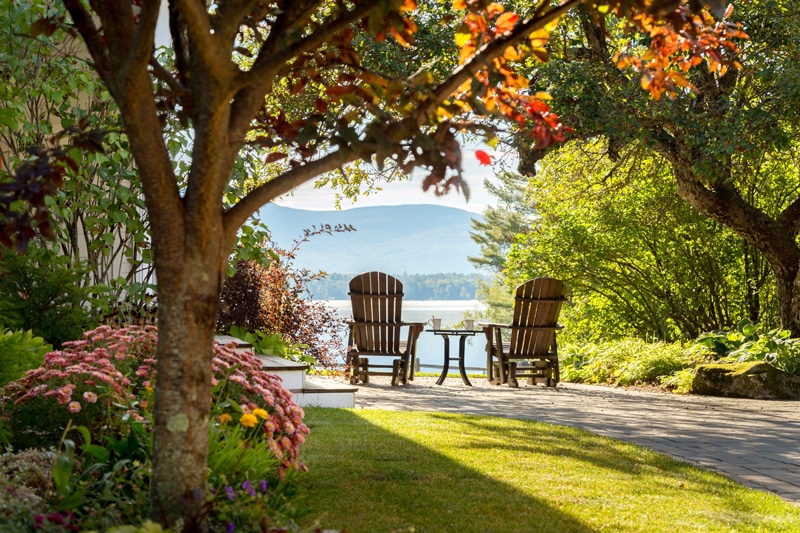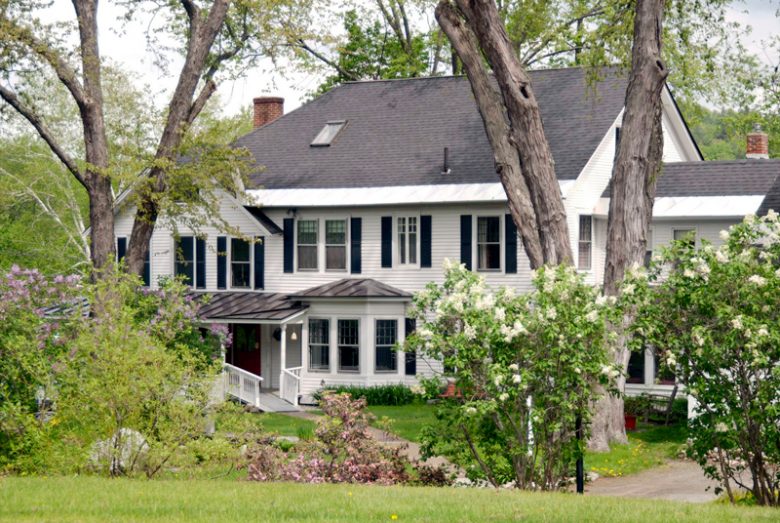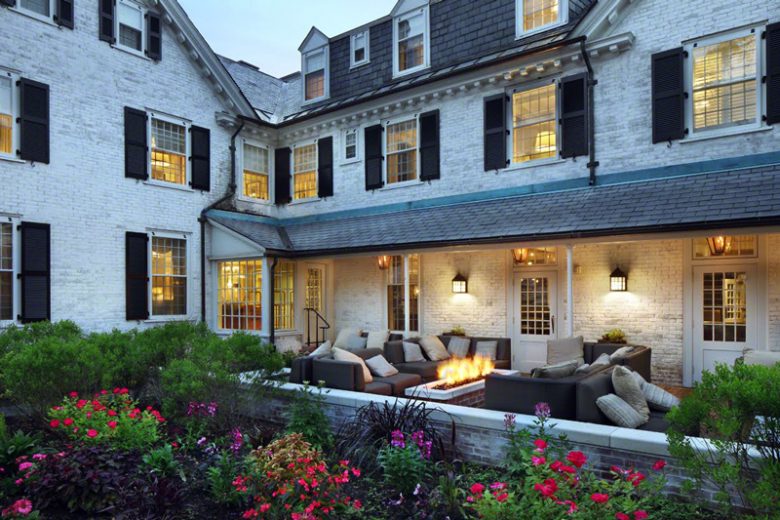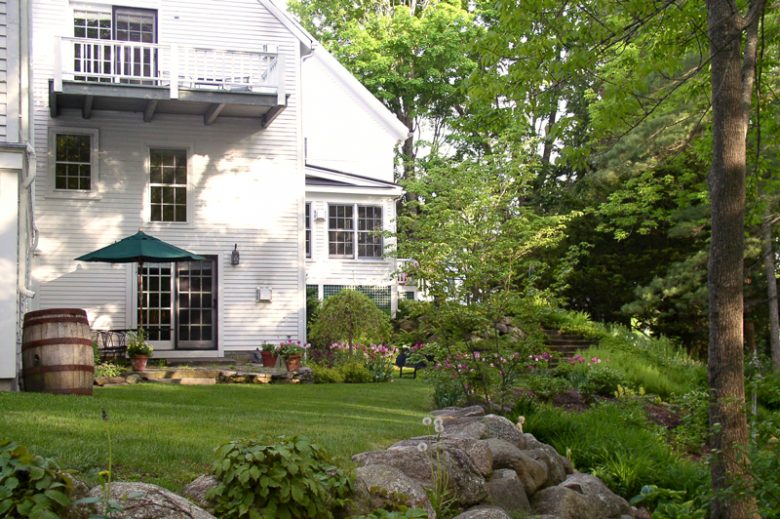The Best 5 New England Inns for Spring
These New England inns are not merely ideal for cuddling up when mornings and evenings are still nippy. Each also offers a fresh twist on spring that will renew your reverence for nature and its infinite possibilities.

Water views at the Inn at Pleasant Lake.
Photo Credit : Courtesy of Inn at Pleasant LakeSpring is New England’s mysterious season. Its arrival is more unpredictable than peak fall foliage. Embracing its splendors requires a keen eye, an open mind, and, typically, one more warm, fleecy layer than you anticipated. These inns are not merely ideal for cuddling up when mornings and evenings are still nippy. Each also offers a fresh twist on spring that will renew your reverence for nature and its infinite possibilities.

Photo Credit : Courtesy of Golden Stage Inn
The Best 5 New England Inns for Spring
Golden Stage Inn
Proctorsville, VT
Julie-Lynn Wood was a beekeeper before she was an innkeeper. So, she and husband Michael relocated their lives and two hives when they bought this expanded-over-the-centuries stagecoach stop in 2010. If you’re curious about bees — and you will be after breakfast chatter inevitably swarms around the mysterious box visible through solarium windows, and the honey drizzled over yogurt and fresh fruit — borrow a beekeeping suit and help with hive chores.
Observing from indoors is an option, but spring is the best time for an up-close encounter. Bees are gentlest when they’re emerging from semidormancy and no longer guarding honey stores. You might see the queen laying eggs: She produces 1,000 daily.

Photo Credit : Courtesy of Inn at Pleasant Lake
Inn at Pleasant Lake
New London, NH
With a cocktail in your hand, ancient apple trees blooming in fiery fuchsia overhead, and clean, sprawling Pleasant Lake and slowly greening Mount Kearsarge directly in view, you’ll find every sensory receptor you possess is tingling with anticipation for the multicourse dinner you’re about to savor inside this 1789 farmhouse turned inn. “Handcrafted” and “hyperlocal” are chef Bryan Leary’s hallmarks. He doesn’t just bake bread; he makes the butter. He doesn’t just source meat and produce from 28 farms within a 30-mile radius; he plunders the inn’s gardens, forages on-site, and incorporates maple harvested from the property’s own trees.
As the sap flow slows and grape hyacinths and daffodils sprout up along old stone walls, you might bump into Joan Cobb, who knows this landscape’s plants like no one else. At 93, the inn’s longtime gardener is officially retired but still vigilant about her babies.

Photo Credit : Courtesy of Lord Jeffery Inn
The Inn on Boltwood
Amherst, MA
Once the calendar flips to April, it’s go-time for outdoor dining at this 49-room landmark in the heart of collegiate Amherst (formerly The Lord Jeffrey Inn). Cushy furniture reappears beside the toasty fire pit and the rooftop terrace’s towering brick fireplace. With gas lamps and sunset amplifying the rosy glow, you’ll be sipping Aperol spritzes and sharing 30Boltwood’s spring harvest–inspired dishes alfresco while most of New England is still waiting to defrost. Many eco-conscious features of the inn’s dramatic 2012 renovation are hidden, but you’ll know you’re helping keep the 90-something Lord Jeff spry and green when you use your keycard to power up your room.
Supporting local agricultural enterprises is equally effortless. Step outside any Saturday starting in late April, and you’re smack in the middle of the farmers’ market on the town common, where spring’s abundance is tantalizingly displayed.

Photo Credit : Courtesy of Camden Maine Stay Inn
Camden Maine Stay Inn
Camden, ME
In Maine, the wait can seem interminable. Then, pow! A daffodil or tulip dukes its way up out of the thawing mud. Book a stay at Camden’s Maine Stay Inn during the second half of April, and odds are favorable you’ll witness this life-affirming little victory. Although you’d never guess it if you simply motored by on U.S. 1, behind this 1802 mansion built by one of John Adams’s nephews there’s a hardy one-acre garden. (The Common Ground Suite and Carriage House Room offer the best access and views.)
Springtime rates are off-peak, and each day after that initial miracle you’re one step closer to curling up by the gurgling brook with a book, watching Japanese dogwood blossoms erupt, and spying chickadees, Maine’s state bird. Behind the garden looms Mount Battie, whose hiking trails and summit auto road are a mile away.

Photo Credit : Courtesy of Margin Street Inn
Margin Street Inn
Westerly, RI
It’s rare to be among the first guests to check into an inn. That privilege is elevated to a thrill when the property is a riverside 1850 mansion restored with the same finesse its new owner, financier and philanthropist Chuck Royce, has brought to a growing list of Rhode Island structures once thought doomed. During this season of beginnings, you’ll have a front-row porch seat for the awakening of enormous beech trees, newly planted cutting gardens, and landscape elements conceived more than a century ago by Warren Manning, the Frederick Law Olmsted protege who also designed Westerly’s Wilcox Park.
You’ll also experience what is just the seed of much larger dreams for the Perry Homestead’s antique buildings and acreage — at preseason rates that will likely never be this affordable again.
Kim Knox Beckius
Kim Knox Beckius is Yankee Magazine's Travel & Branded Content Editor. She is a Connecticut-based writer and photographer whose passion for New England inspires everything she does, whether it's riding a giant inflatable lobster in her wedding gown, naming her daughter so she shares initials with L.L. Bean or sending free fall leaves in the mail to autumn lovers around the world. She’s the author of six books on Northeast travel, including New England’s Historic Homes & Gardens, and has been the voice of New England travel for About.com since 1998. GoNewEngland.about.com
More by Kim Knox Beckius

